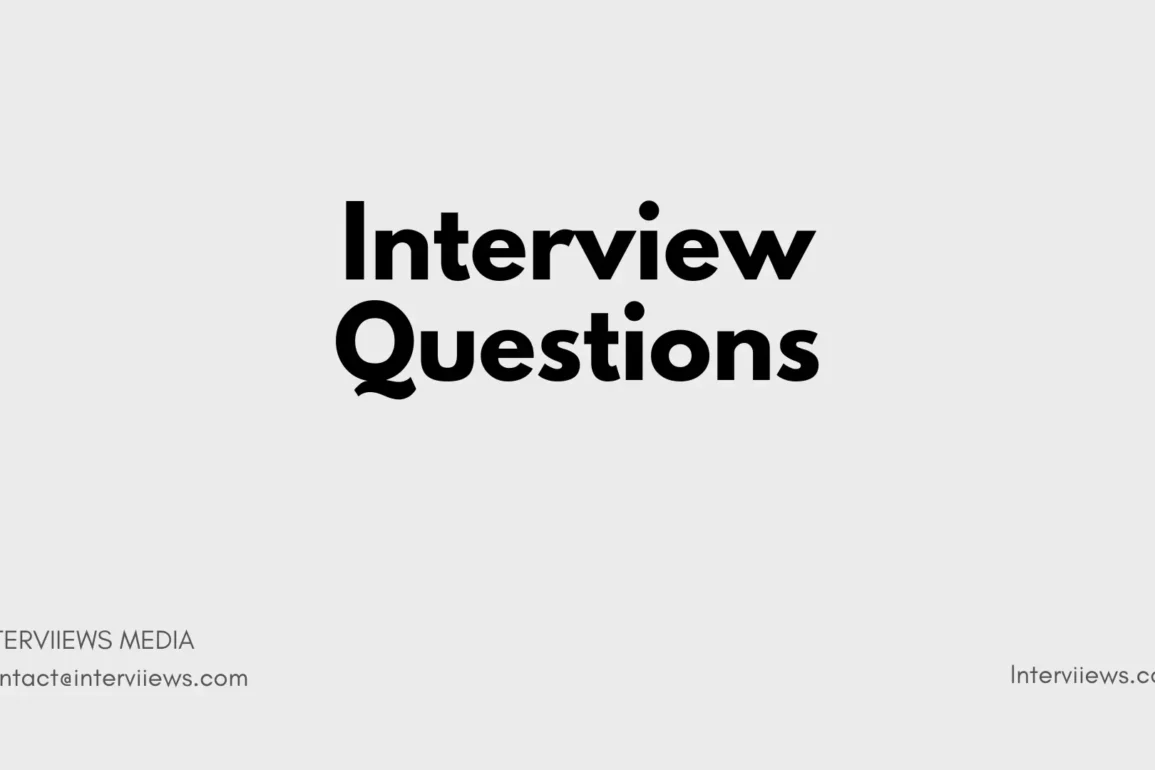Navigating conversations through interviews can be daunting, whether you’re a job seeker, recruiter, or simply engaging in meaningful dialogue. Did you know that the right questions can lead to a more profound connection? In fact, asking deep, insightful questions can reveal far more about a person’s character and experiences than surface-level chit-chat ever could! In this article, we’ll explore good deep interview questions tailored for various contexts—be it professional or personal. Buckle up and get ready to enrich your conversations!
Why Deep Interview Questions Matter
You know, diving into deep interview questions is like peeling back the layers of an onion, kinda messy but oh so rewarding! 🙌
When I first started interviewing candidates, I used to stick to the surface stuff: “What are your strengths?” or “Why do you want this job?” But after a few sessions, I realized that those questions didn’t tell me much about who the person really was or how they’d fit into our culture. So, being curious by nature, I decided to change my approach and ask deeper questions. Trust me; it transformed my interviews!
So, what exactly are deep interview questions? These are the queries that encourage people to reflect on their experiences, values, and thought processes. Instead of getting canned responses, you’re opening the door for a meaningful conversation. Think about it: a question like “What’s your definition of success?” pushes the candidate to think critically about their life and career, revealing their motivations and mindset.
Understanding the Significance of Depth in Interviews
Let me tell ya, the depth in interviews matters because it fosters genuine connections. When interviewees feel comfortable diving deeper, it’s less about reciting rehearsed lines and more about honest dialogue. I once asked a candidate about their proudest achievement and why it mattered to them. Their eyes lit up as they recounted a challenging project that turned out great, and in that moment, I wasn’t just hearing about their skills—I was learning about their passion and perseverance.
Key Benefits for Interviewers and Interviewees
Here’s the scoop on the benefits of using deep questions: for interviewers, it helps in evaluating the person beyond their skills on paper. You want to know how someone approaches problems, works in a team, and connects with your core values.
As for interviewees, deep questions allow them to showcase their talent in a more authentic way. It’s also a chance for them to determine if they connect with the company culture. After all, finding a job isn’t just about the paycheck; it’s about finding the right fit, a place that resonates with your values.
But here’s the kicker: while deep questions are essential, they can be a double-edged sword. A little too deep and you may end up in TMI territory! 😂 I learned that the hard way when I asked a particularly introspective candidate about their childhood dreams. They went off on a tangential saga that had me both intrigued and slightly confused. Lesson learned: question depth is important, but context is key.
So, take the time to craft questions that not only reflect the skills you’re looking for but also get to the heart of who a candidate is. In the end, you’ll not just fill a position; you’ll build an enriching workplace culture.
Types of Deep Interview Questions
Professional Context
- What do you consider the biggest gap in our organization, and what steps may you take to address it?
- How can we make our organization more profitable or successful in the future?
- Discuss your vision for your career path and its alignment with the company’s values.
When I first started interviewing candidates for positions in my team, I had no real idea what deep interview questions actually meant. I mean, I thought asking about hobbies would do the trick. Spoiler alert: it didn’t. But there is a big difference between asking someone about their degree and diving into what they really think about the organization. It’s super important to dig deeper to see how they can contribute beyond the surface level.
Take this question, “What do you consider the biggest gap in our organization, and what steps may you take to address it?”
This one packs a punch because you’re inviting candidates to assess your organization critically. They’re not just a potential employee but a future problem solver. I’ve had candidates share some really insightful points that led to discussions about refining our processes. It’s like, “Whoa, I hadn’t thought of that!”
Moving on, casually tossing around, “How can we make our organization more profitable or successful in the future?” can seem daunting, but it gives insight into their thought processes. You can see if they’ve got that forward-thinking mindset or if they’re just comfortable with the status quo. For example, one candidate once suggested implementing a referral program, and let me tell you, we enacted that like ASAP.
And then there’s the classic, “Discuss your vision for your career path and its alignment with the company’s values.” This isn’t just a buzzword question. You want to know if they want to grow with you. Are they a fit? Or are they just passing through? Every organization has a vibe, and if the candidate can’t see themself in it, it’s time to move on.
Personal Context
- What does success mean to you, and how do you know when you’ve attained it?
- Describe a pivotal moment that changed your perspective on life.
- How have your life experiences shaped your current approach to challenges?
Now, personally—wow, deep questions really bring out the *real* in people.
When you ask, “What does success mean to you, and how do you know when you’ve attained it?”, you learn a lot more than just achievements. You uncover their motivations. A candidate once told me that for them, success wasn’t just a big fat paycheck but having more time to volunteer. Talk about perspective! This helps you figure out if their values align with your company’s mission.
Then there’s the “describe a pivotal moment that changed your perspective on life.” This one can get juicy. Not only does it expose their character, but it also shows resilience. I’ve had candidates share stories of personal loss or major career shifts, reminding me of my own journey through challenges. It reassures you. We all have struggles, and seeing how they’ve dealt with theirs can be so telling.
And the question, “How have your life experiences shaped your current approach to challenges?” is a great one. It shows how adaptable they are or if they might crumble under pressure. I remember one candidate talking about how their side hustle taught them to navigate obstacles, like running into financial hiccups while chasing their passion. This can be an excellent indicator of how they might handle challenges with you.
Situational Questions
- How do you handle conflict within a team environment?
- Describe a time when you had to act quickly under pressure.
- What strategies do you employ to navigate uncertainty?
Then we enter the world of situational questions—arguably the most fascinating part! It’s always like watching a reel of how they might respond in real-life scenarios.
Take “How do you handle conflict within a team environment?” That’s crucial. I once made the mistake of assuming everyone loves to play nice. Big mistake! It was enlightening to see how candidates’ previous experiences made them address conflicts straight on or sidetrack the issues. You could almost feel the electricity in the room shift when they told their stories.
Next up, “Describe a time when you had to act quickly under pressure.” Wow, the stories candidates share can really surprise you! You can see their adrenaline kick in as they describe the moment they saved the day, pulled an all-nighter, or completely pivoted their project. One candidate came prepared with a war story about saving a client from a PR disaster. Let me tell you, I was at the edge of my seat!
Finally, “What strategies do you employ to navigate uncertainty?” This can reveal so much about their mindset. I love hearing how candidates tackle unpredictability. Some might rely on structured frameworks, while others might say they go with their gut. Both approaches can fit well; you just have to determine what fits your team’s style.
So there you have it, folks! These deep interview questions, when guided correctly, will not only help you dig into a candidate’s professional persona but also bring out the human side that makes them unique. Remember, interviews are a two-way street!
Effective Techniques for Asking Deep Questions
Okay, so let’s dive into the nitty-gritty of asking deep interview questions. I remember one interview I conducted—it seemed like I was just going through the motions. You know how it goes—standard questions that ended up getting me standard responses. I left feeling like I had learned nothing about the candidate. It was then I realized the need for a revamped game plan when it comes to asking deeper, more impactful questions. So, let’s break down some effective techniques!
How to Frame Your Questions for Maximum Impact
First off, framing your questions matters a ton. Instead of asking something like, “Tell me about your experience,” consider rephrasing to something more open-ended, like “Can you describe a specific challenge you’ve faced and how you approached it?” This invites the candidate to share a story rather than just reciting their resume. It creates space for nuances that typical questions can overlook.
Another technique that really helped me was using the STAR method—Situation, Task, Action, Result. When I first learned about this, I thought, “Wow, this could really save my interviews!” For instance, when someone tells you, “Yeah, I led a project,” you can lean in and ask, “What was the specific situation, and how did you get your team to achieve the results?” It brings a richer context to their skills. Also, never forget to break down competencies—if you’re curious about how they manage stress, don’t just ask, “How do you handle stress?” Instead, try, “Can you tell me about a time when you were under pressure, and how you handled it?”
Tips on Maintaining a Conversational Flow After Deep Inquiries
One common mistake I made early on was feeling like an interrogation officer after throwing out a deep question. I’d throw a question out there and then stare blankly as if waiting for an answer like a deer caught in headlights. It’s crucial to maintain that conversational flow! One way to do this is to actively listen. When they respond, don’t just nod—engage with their answers. Try follow-up questions that are based on what they just said. Like if they mention how they dealt with stress, ask, “What did you learn from that experience?” It keeps the dialogue going and makes the person feel valued. They start sharing more because they know you’re genuinely interested.
The Importance of Tone and Delivery
The tone you use can totally shape the conversation! I can’t stress enough how important it is to deliver your questions with a warm, encouraging tone—especially when diving into deeper topics. When I first started interviewing, I sometimes came off a bit too serious, and it shut down the candidates’ willingness to open up. But then I started smiling, changing my tone, and even adding a bit of lightness. For example, if you’re asking a heavier question, maybe lead in with a lighter hook: “Okay, here comes the big one! Let’s talk about a time you faced a challenge…” It lowers the stakes, making it easier for them to engage.
And don’t forget about the pauses! Giving candidates a moment to think can invite deeper reflections. I used to fill every silence which made things awkward! Now I embrace those pauses. They can be golden for extracting thoughtful insights.
So, remember—how you frame your questions, how you keep the conversation flowing, and your tone really makes all the difference. With a little practice and some genuine interest, you can transform your interviews from ordinary to extraordinary.
Active Listening and Engagement Strategies
Active listening—oh boy, where do I even start? I used to think it just meant nodding along while planning my next brilliant response. But, honestly? I was often missing the point entirely! One time, during an interview, I was so focused on how I would answer the next question that I completely blanked on the interviewer’s entire previous explanation about their company culture. Seriously, it was like tuning into a radio station but only catching the weird static. So, let me share some real techniques I’ve learned that totally transformed my approach!
How to practice active listening for better follow-up questions
First things first, you gotta focus. I mean, really focus. Put your phone away—yeah, I know it’s a lifeline, but it can wait. I’ve found that taking a moment to breathe before answering helps solidify my understanding of what’s been said.
Secondly, jotting down key points while the other person is talking can help tremendously. Trust me, I learned this the hard way! One time, I forgot a key detail from my last conversation with a hiring manager because I tried to remember everything mentally. If you practice this note-taking skill, you’ll develop follow-up questions that actually connect with what’s being discussed.
Techniques to show genuine interest during the interview
Eye contact, folks—make it happen! And don’t just stare like a deer in headlights. Smile, nod, and respond to cues. I did an interview once where I practiced mirroring the interviewer’s energy. They seemed jazzed about their new project, and it just flowed better. I asked them questions that were way more personal and relevant to what they cared about. It showed I actually valued their input, you know?
Also, paraphrasing what’s been said is golden. After they finish a point, try restating it in your own words before diving into your answer. It not only shows that you’re paying attention but also gives them a chance to clarify if you’ve misunderstood anything.
Ways to create a comfortable environment for open dialogue
Creating a relaxed atmosphere can be tricky. I found that starting with small talk helps ease tension. Anecdotes or light humor can break the ice, just make sure it fits the vibe of the conversation! One time, I used a funny mishap from my past to lighten the mood, and it worked like a charm. Everyone erupted in laughter, and it became way more fluid from there.
But the biggest game changer for me? Being authentic. If you’re genuinely interested and invested, that energy tends to radiate. Encourage an open dialogue by asking questions that invite elaboration or personal stories—people love sharing experiences, and it makes the conversation unforgettable!
So, there you have it! With these techniques in your toolkit, you’re guaranteed to boost your active listening skills and enhance the interview experience for both you and your interviewer.
Examples of Successful Deep Interview Experiences
Deep interviewing can feel a bit like stepping into uncharted waters at first. You’ve got to dig past the surface-level questions and jump right into the deep end with meaningful, thought-provoking queries. I still recall my very first experience attempting this technique during a project in grad school. I was tasked with interviewing a local business owner who had turned his struggling shop into a booming success.
Rather than sticking to the typical “What do you do?” or “How did you get started?” questions, I decided to explore deeper. I asked him about his motivations, fears, and the moments that really changed his path. What I learned was incredible. He spoke about a terrible day when he almost closed his doors for good, revealing the raw vulnerability he experienced, which later fueled his determination. It was like a light switch flipped; instead of just collecting facts, I was connecting with him on a human level.
Case Studies That Shine a Light
Let me share another moment that really highlighted the magic of deep interviewing. A friend of mine, Lisa, was assisting a major tech firm in their recruitment process. She was conducting interviews for a high-stakes role, and instead of the usual barrage of questions, she utilized deep questions that veered away from the predictable and ventured into the personal.
One candidate, under the stress of the interview, opened up about how a childhood failure had motivated him throughout his career. Lisa was taken aback but saw it as a chance to reassess his character instead of adhering strictly to the expected corporate persona. This emotional breakthrough turned the air of the interview around, resulting in the company hiring him—not just for his skills, but for his tenacity and authenticity. That’s how powerful a good deep question can be!
Testimonials from the Field
I’ve spoken to many professionals who have embraced this deep interview technique. A hiring manager I chatted with told me, “When I started focusing on deep questions, I learned more in those 45 minutes than I had in weeks of traditional interviews. It was like peeling an onion. Sure, there’s some tears, but you get to the best part!” How relatable is that, right? It emphasizes how essential it is to make candidates comfortable enough to share their real selves.
Another job seeker remarked, “I was nervous at first. But when I was asked what my biggest lesson learned was from failure, I felt like I could show my true colors. It was liberating!” Hearing stories like this reassures me that deep interviewing isn’t just effective; it allows individuals to display their passions and to relate their unique experiences.
Real-Life Applications and Breakthroughs
In real life, the application of deep questioning can create moments of insight that are magical. Think of an organization trying to innovate; they might benefit tremendously from interviewing their employees deeply about their daily challenges. One company I heard about used deep-interviewing techniques to understand their turnover rates better. They asked employees not just what made them leave, but how they felt on their first day or what dreams they held while working there. The feedback shaped entire retention strategies.
Did you know that companies that engage in this deeper dialogue see up to a 55% increase in employee satisfaction? That translates into real business improvements and a happier workplace too! Talk about a win-win situation!
In summary, the successful use of deep interview techniques can be a game-changer not only in hiring but in understanding people on a level that fosters genuine connection and insight. I can’t reiterate enough: don’t shy away from those probing questions that can make all the difference. You never know what incredible breakthrough might be waiting just beneath the surface.
Conclusion
In conclusion, employing good deep interview questions can transform ordinary conversations into enlightening exchanges! Whether you’re aiming to advance your career, connect on a personal level, or simply want to improve your interviewing skills, the art of asking deeper questions is invaluable. So, why wait? Explore our full list of deep interview questions to enhance your conversations! Get ready to dive deep and discover meaningful insights!





